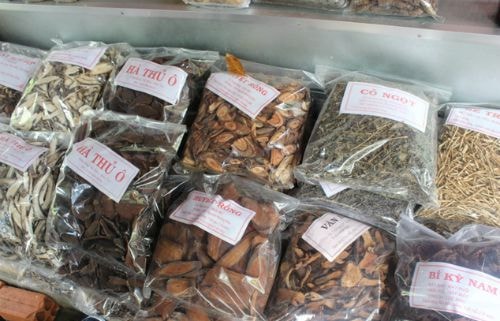Oriental medicine is contaminated with many disease-causing toxins.
People often burn sulfur in containers of traditional Chinese medicine so that the chemical vapors can kill insects, mold, etc. If sulfur accumulates in large amounts, it can cause cancer.
Many people today tend to treat their illnesses with traditional medicine because they are afraid of the side effects of Western medicine. However, traditional medicine practitioners warn that the market for traditional medicine currently has many fake or toxic drugs due to the use of many chemicals in the processing and preservation process.
Pharmacist Le Kim Phung, former lecturer of the Faculty of Traditional Medicine, University of Medicine and Pharmacy, Ho Chi Minh City, said that there are many types of counterfeit medicines such as safflower, red polygonum multiflorum, honeysuckle, Chinese yam...; or are preserved with toxic substances such as sulfur, lead, zinc, mercury, or are contaminated with mold...
According to statistics from the Institute of Medicinal Materials, 30% of pharmaceuticals in circulation contain mold, especially aflatoxin. This toxin in medicinal materials causes liver damage and liver cancer. These toxins are not destroyed at high temperatures (160-170 degrees Celsius), so they remain when the medicine is boiled.
According to pharmacist Phung, people who prepare traditional medicine often burn sulfur in medicine containers to get the vapor to kill insects, mold and make the medicine more flexible, soft, whiter and more beautiful. However, sulfur is a toxic substance, causing headaches, dizziness, headaches, fever, diarrhea and vomiting. If this substance accumulates in the body, it will cause cancer.
Panax notoginseng is a medicinal herb that is often polished with lead for beauty. Lead is very toxic. When decocting medicine to drink, a large amount of lead will diffuse into the medicine and can cause poisoning. Children who drink medicine containing lead will have slow growth and poor mental development; adults will have high blood pressure and heart failure. When the amount of lead in the body accumulates to 0.8 ppm, it will cause anemia due to hemoglobin deficiency, and women are prone to miscarriage.
Zinc poisoning is also acute. Ingestion of large amounts of zinc can be fatal, with symptoms including a persistent metallic taste in the mouth, vomiting, diarrhea, cold sweats, and a weak pulse. Death usually occurs 10 to 48 seconds after ingestion.
Mercury is often used to make medicinal herbs such as cinnabar. Mercury breaks chromosomes and prevents cell division, causing infertility in men if mercury poisoning lasts for a long time.
"Fake oriental medicine, processed with chemicals that are not processed properly, affects the reputation of the traditional Vietnamese medicine industry. Traditional medicine production and processing facilities need to put the reputation of the quality of the medicine first," said pharmacist Kim Phung.
 |
| Traditional medicine must be ensured to follow proper standards from the stages of purchasing, transporting, preserving and using. Illustration photo: Le Phuong. |
According to pharmacist Kim Phung, combining traditional medicine with modern medicine is an important requirement for the development of Vietnamese medicine. Each medical field has its own characteristics in terms of theory, history of development, research methods, etc., but they are all sciences that study human physiology and pathology.
Combining Eastern and Western medicine is not simply combining Western and Eastern medicine, but must be based on a scientific and reasonable basis to achieve the maximum effectiveness for the patient, not arbitrary and reckless because it can cause poisoning due to drug reactions in the patient. Combining Eastern and Western medicine needs to be based on the diagnosis results of Western medicine, the results of paraclinical tests, the patient's constitution, the pharmacodynamic effects based on the active ingredients of plants, herbs, drug interactions...
Pharmacist Kim Phung emphasized that Oriental medicine is made from natural herbs, but when used, it must be under the guidance of a medical professional. The following principles should be noted:
- Use as directed: Patients need to be examined and have instructions from a medical specialist, avoid using it on their own. In the chemical composition of herbs, there are groups of substances that have very strong effects, using them incorrectly will lead to unpredictable harm. Many cases of hospitalization and emergency are due to misuse of herbs.
- Use the correct dosage: There are herbs with non-toxic medicinal properties, but overusing them can lead to unpredictable harmful effects.
- Use the right medicine for the right disease: Each person's body is different, so avoid listening to rumors from others and applying it to yourself. Sometimes users suffer side effects due to drug interactions.
- Prepared correctly: Boil the medicine correctly, roast and marinate it properly, thereby promoting the full therapeutic effect of the medicine and achieving maximum effectiveness.
- Traditional medicine must be ensured to be in accordance with the correct specifications: Control from the stage of purchasing, transporting, and storing in the correct humidity, temperature, and light conditions, so that the medicine does not deteriorate or lose quality. Normally, well-preserved traditional medicine has a shelf life of only one year.
According to VnExpress






